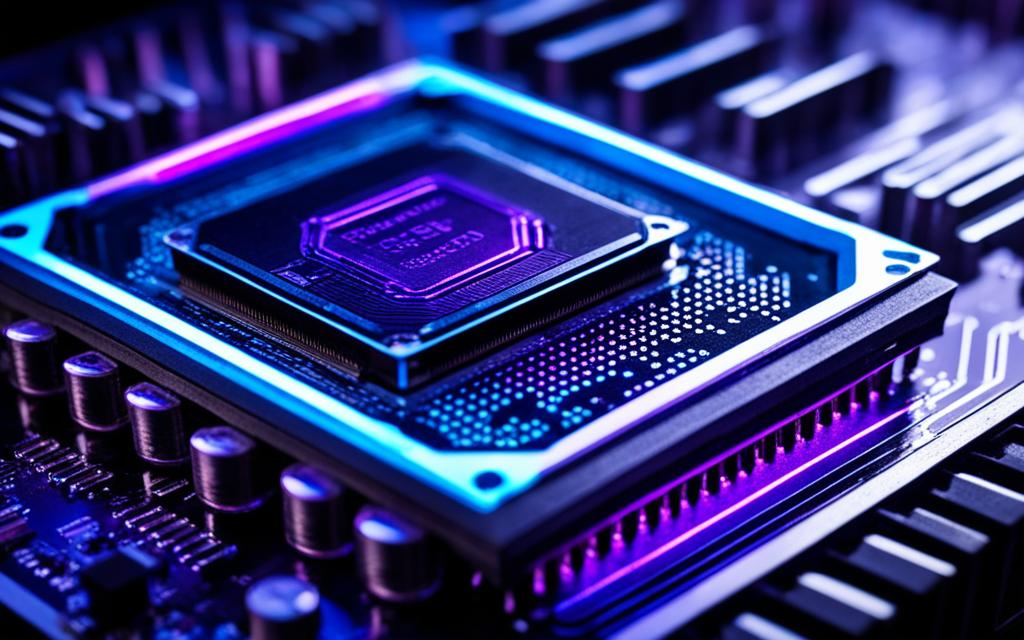Table of Contents
Keeping the right CPU temperature during games is very important. It helps with great CPU performance. Too much heat can slow down gameplay and might even damage the CPU forever. You should keep the CPU temperature between 70°C and 85°C when playing games. This not only makes your computer run better but also makes it last longer.
Managing these temperatures well means a smoother gaming experience without the game stopping because of the heat. For details on the best CPU temperatures, visit this resource1.
Key Takeaways
- Maintaining CPU temperatures between 70°C and 85°C is ideal during gaming.
- Excessive heat can result in thermal throttling, impacting performance.
- Monitoring CPU temperature is essential for long-term hardware longevity.
- Proper cooling solutions and airflow can significantly affect temperature management.
- Regular maintenance, including thermal paste replacement, is recommended.
Understanding CPU Temperatures
The CPU, or central processing unit, is key to any computer. It acts like the brain, handling all sorts of calculations. This is especially true when playing games or running heavy programs. As the CPU works, it gets hot. So, it’s essential to know about CPU temperatures and how they affect your computer’s performance.
What is a CPU?
A CPU is a complex hardware that follows commands and processes information in your computer. It has several cores which make it faster and more efficient, especially for multitasking and playing games. To avoid problems, it’s designed to work best within certain temperature limits.
How CPU Temperature Affects Performance
The temperature of a CPU is vital for keeping it running smoothly, especially under pressure. Normally, a CPU’s temperature is between 30°C and 40°C when it’s not doing much and can safely reach up to 80°C when working hard2. However, if it often goes over 80°C, the CPU might slow down to prevent damage, known as thermal throttling3. If it gets hotter than 90°C, it could be bad news, quickly causing harm2.
Keeping an eye on your CPU’s temperature helps make sure it works in a safe range. Good cooling, like fans and heatsinks, is crucial for removing heat. If your cooling isn’t up to scratch or there’s too much dust, temperatures might go too high. This can affect how well your computer works4.
| CPU Temperature | Condition | Impact on Performance |
|---|---|---|
| 30°C – 40°C | Idle | Optimal Performance |
| 60°C – 70°C | Under Load | Normal Performance |
| 70°C – 80°C | Gaming/Heavy Load | Safe Operating Range |
| 80°C – 90°C | High Load | Risk of Throttling |
| Over 90°C | Dangerous | Potential Damage |
By keeping your CPU’s temperature in the right range, you can boost performance and extend its life234.
Normal CPU Temperature Ranges
Knowing the right CPU temperature is crucial for keeping your computer running well. Different things, like the type of CPU and how good the cooling system is, affect this. It’s important to keep your CPU at a safe temperature to avoid crashes or damage.
Typical Temperature Ranges for Different CPUs
When gaming, CPUs usually stay between 60°C and 80°C (140°F to 176°F). But, each CPU type has its own normal temperature. For example, the Intel Core i7-9700K is cooler when idle, staying at 30°C to 40°C (86°F to 104°F). And it can go up to 85°C (185°F) when working hard5. On the other hand, the AMD Ryzen 7 3700X is similar when idle but can handle up to 95°C (203°F) under load without problems5.
Factors Affecting CPU Temperatures
Many things can change how hot your CPU gets. This includes the room temperature, how good your cooling system is, and what you’re doing on the computer. Typically, a CPU should be cooler than 50°C when not doing much. And it should be under 70°C when under a bit of pressure6.
Doing things that use a lot of graphics or running big tests makes the CPU work harder. This can make it hotter. But, with enough air moving around and a good cooling setup, you can keep the heat down. This helps your computer run smoothly.
What Should My CPU Temp Be When Gaming
When you’re gaming, knowing the right CPU temperature is key. It helps you avoid overheating and keeps your game running smoothly. The best temperature for gaming CPUs is between 70 to 80 degrees Celsius (158°F to 176°F) when busy, aiming not to exceed 80°C (176°F)78. Staying within these limits is crucial. It prevents performance issues and damage to your hardware over time.
Recommended Temperature Range for Gaming
To get the most out of your games, keep CPU temperatures under 85°C (185°F)8. Going over this might slow down your CPU because it tries to cool down. Aiming for 60°C to 70°C is best to keep things running long-term8. It’s smart to regularly check your CPU’s temperature.
What Happens If Temperatures Exceed Limits
If your CPU often gets hotter than 80°C, you might face freezes or crashes8. A really high temperature, over 95°C (203°F), is dangerous7. Upgrading cooling and improving airflow can prevent these problems. Regular checks and maintenance are key for the best performance.
Methods to Monitor CPU Temperature
Keeping an eye on CPU temperature is key to good system performance and safeguarding your gaming hardware. Gamers use a mix of software and hardware to closely watch their CPU’s condition.
Utilising Software for Temperature Monitoring
Specialised software tools are great for checking CPU temperature. Tools like MSI Afterburner and Core Temp offer detailed temperature readings. They help with managing overclocking too9.
MSI Afterburner shows CPU and GPU temperatures in real-time, useful for adjustments. On the other hand, Core Temp tracks each CPU core’s temperature for accurate data9. GPU-Z provides both temperature info and a graphical view of GPU stats, making monitoring more enjoyable.
Hardware Solutions for Real-Time Monitoring
Hardware solutions are also vital for keeping tabs on CPU temperatures. Modern motherboards have built-in sensors that check temperatures, ensuring your system stays cool during intense gaming. If the temperature goes over 80°C, it’s a sign you need to cool down your system to prevent damage9.
Improving cooling effectiveness or ensuring your system has good ventilation can solve overheating issues.
| Monitoring Tool | Key Features |
|---|---|
| MSI Afterburner | Real-time properties display, on-screen temperature monitoring, overclocking support |
| Core Temp | Individual core monitoring, minimum/maximum temperature values, percentage load display |
| GPU-Z | Graphical representation of GPU stats, temperature display, customization options |
By proactively monitoring the CPU temperature with these tools and solutions, gamers can boost their system’s performance. They also avoid risks tied to high temperatures, extending their rigs’ life10.
Cooling Solutions for Optimal Performance
Keeping your CPU cool during gaming is key for its performance and life span. There are many CPU cooling options available. They make sure your system manages heavy tasks without getting too hot.
Stock vs Aftermarket CPU Coolers
Stock coolers that come with CPUs are fine for regular use. But they might not keep up during intense gaming. Aftermarket coolers, which can be air or liquid, do a better job at keeping things cool. They help maintain safe temperatures.
A good AIO water cooler, for example, can last about five years. It’s a solid choice for gamers11. These advanced cooling options are great at getting rid of heat. This keeps CPU temperatures from going too high.
The Importance of Good Case Airflow
Having good airflow in your case is critical to keeping CPU temperatures low. It helps push out warm air and bring in cool air. How you manage cables, deal with dust, and place fans matters a lot for airflow.
Looking after your system by keeping it clean reduces overheating risks2. Proper airflow doesn’t just improve cooling. It also stops thermal throttling, which can harm your CPU12.
Managing CPU Temperatures During Intense Gaming
For a great gaming experience, keeping CPU temperatures in check is crucial. Using cooling best practices greatly helps during intense play. Usually, a CPU’s normal working temperature is between 30°C (86°F) to 40°C (104°F). However, during gaming, aiming to keep the temperature between 75°C (167°F) and 80°C (176°F) is key to prevent problems13. If the temperature goes over 80°C (176°F), it affects the CPU’s performance. It may also cause thermal throttling. This makes the CPU reduce its speed to stop overheating13.
Best Practices for Maintaining Cool Temperatures
Choosing top-notch cooling methods can boost your CPU’s effectiveness. Here are top tips:
- Opt for aftermarket CPU coolers to better get rid of heat.
- Keep the system clean to ensure airflow isn’t blocked by dust.
- Change thermal paste often to improve heat transfer.
- Use a space with good air circulation to help cool down your setup.
Regular Maintenance Tips to Enhance Cooling
Regular maintenance is a must for keeping performance high. Think about these maintenance tips:
- Clean your gaming setup and parts often.
- Adjust fan speeds to get better airflow, either in BIOS or through software.
- Keep an eye on CPU temperatures, especially before and in the middle of gaming.
Following these pointers helps gamers keep CPU temperatures low. This extends hardware life and ensures smooth gaming14. Remember, high temperatures can harm your PC permanently13.
Understanding Overclocking and its Impact on CPU Temperature
Overclocking lets you improve your CPU’s performance beyond its normal limits. It’s great for tasks like gaming and video editing. By increasing the CPU’s clock speeds, you get more power. However, this also raises the CPU’s temperature. If it gets too hot, it could harm your computer. It’s very important to keep an eye on the temperature to make sure your system stays safe and works well.
The Risks and Rewards of Overclocking
Overclocking can make your computer much faster, but it’s not without risks. The extra speed and power mean more heat. That’s why having a good cooling system is a must. If the CPU gets too hot, it can become unstable or even get damaged. This might even shorten its life1516. Thankfully, most new computer systems have built-in safety features. These help avoid damage, making overclocking less risky. Still, it’s important to regularly check the CPU temperature to keep everything running smoothly.
How to Safely Overclock Your CPU While Gaming
Before you start overclocking, it’s crucial to prepare and follow safe steps. Start with stress tests on your CPU to see if it’s stable15. Use tools like Prime95 or Cinebench for this. Slowly increase the CPU’s multiplier to get to the best speed without causing problems. Good cooling methods, like fans or liquid cooling, are key. They help keep the temperature down during heavy use. This keeps your CPU running well for longer16.
Conclusion
Keeping your CPU cool while gaming is crucial. It helps improve your gaming and makes your CPU last longer. Most gamers should try to keep the temperature between 60°C to 80°C during intense games. This is because the heat can go up when the game gets really demanding17.
It’s good to check your CPU temperature often. This way, you can spot any overheating early on and fix it. You might need to clean the dust off or make sure air flows well inside your computer18.
Using better cooling systems and high-quality thermal paste can make a big difference19. Even though CPUs can handle heat spikes over 90°C, it’s important not to let it stay that hot for too long. Doing so can harm your CPU.
By doing all this, gamers can play smoothly without their computer overheating. This helps protect the money they’ve spent on their gaming setup.
FAQ
What is the ideal CPU temperature for gaming sessions?
The best CPU temperature for gaming is between 60°C to 80°C (140°F to 176°F). High-performance CPUs can go up to 85°C (185°F). Staying within these limits helps your gaming performance and makes your CPU last longer.
Why is it important to monitor my CPU temperature while gaming?
Keeping an eye on your CPU temperature stops it from getting too hot. This helps your CPU work better. It also makes your gaming smoother and stops damage.
How can I improve my CPU cooling solutions?
For better CPU cooling, get top-notch coolers and make sure your case has good airflow. Keep your system clean from dust. Changing thermal paste often and managing cables well also helps keep things cool.
What are the risks associated with overheating my CPU?
If your CPU gets too hot, it can get damaged over time. Overheating can make it work poorly, be unstable, or even fail. It’s best to avoid temperatures over 95°C (203°F) to keep your CPU healthy and long-lasting.
How can I utilise software to monitor my CPU temperature?
Use tools like HWinfo or MSI Afterburner to watch your CPU temperature live. These tools show important info. They help you look after your CPU’s health while you game.
What is overclocking and how does it affect CPU temperature?
Overclocking makes your CPU run faster than it’s meant to, boosting performance. It produces more heat and uses more power. So, good cooling and watching the temperature is a must to avoid getting too hot.
What are some best practices for maintaining optimal CPU temperatures while gaming?
Keeping cool when gaming means using good coolers and cleaning your system regularly. Adjust the fan speeds and ensure the room is airy. Tidying and checking airflow also upgrades cooling efficiency.
Source Links
- https://gadgetmates.com/normal-cpu-gpu-temperatures-for-your-pc – Normal CPU & GPU Temperatures For Your PC – GadgetMates
- https://www.noyafa.com/blogs/knowledge-base/good-cpu-temperature – What Is A Good CPU Temperature? A Guide to Keep Your Processor Cool
- https://community.spiceworks.com/t/what-is-a-normal-temperature-for-a-cpu-and-how-do-i-keep-it-low/948818 – What is a normal temperature for a CPU and how do I keep it low?
- https://www.avast.com/c-how-to-check-cpu-temperature – How to Check and Monitor Your CPU Temperature
- https://www.lolvvv.com/blog/normal-cpu-temp-while-gaming – What is a Normal CPU Temp While Gaming?
- https://directmacro.com/blog/post/what-is-optimal-cpu-and-gpu-temp – What Is Optimal GPU Temp and CPU Temperature Range
- https://gamebooster.itopvpn.com/cpu-and-gpu-temp-monitor.php – How to monitor CPU & GPU temperature when gaming in real time?
- https://softwareg.com.au/blogs/computer-hardware/what-should-my-cpu-temp-be-while-gaming – What Should My CPU Temp Be While Gaming
- https://www.electronicshub.org/monitor-cpu-temp-and-gpu-temp-while-gaming/ – How to Monitor CPU and GPU Temp While Gaming?
- https://www.tomshardware.com/how-to/how-to-check-cpu-temp-temperature – How to Check Your CPU Temperature
- https://apexgamingpcs.com/blogs/apex-support/normal-cpu-temp-while-gaming – Normal CPU Temperature While Gaming
- https://computercity.com/hardware/processors/normal-cpu-temperatures – Normal CPU Temperatures: Guidelines for Safe & Optimal Performance – ComputerCity
- https://www.shiksha.com/online-courses/articles/all-about-cpu-temperature-range/ – CPU Temperature Range That Must Be Maintained – Shiksha Online
- https://www.overclock.net/threads/best-way-ive-found-to-massively-lower-in-game-cpu-temps-without-impacting-fps.1800234/ – Best way I’ve found to massively lower in-game CPU…
- https://www.avast.com/c-how-to-overclock-cpu – How to Safely Overclock Your CPU for PCs & Laptops
- https://sofasco.com/blogs/article/role-of-cpu-cooling-fans-in-ensuring-stable-overclocking-performance – Role of CPU Cooling Fans in Ensuring Stable Overclocking Performance
- https://ms.codes/blogs/computer-hardware/what-should-my-cpu-temp-be-while-gaming – What Should My CPU Temp Be While Gaming
- https://softwareg.com.au/blogs/computer-hardware/normal-cpu-temps-while-gaming – Normal CPU Temps While Gaming
- https://www.pugetsystems.com/labs/articles/impact-of-temperature-on-intel-cpu-performance-606/ – Impact of Temperature on Intel CPU Performance












